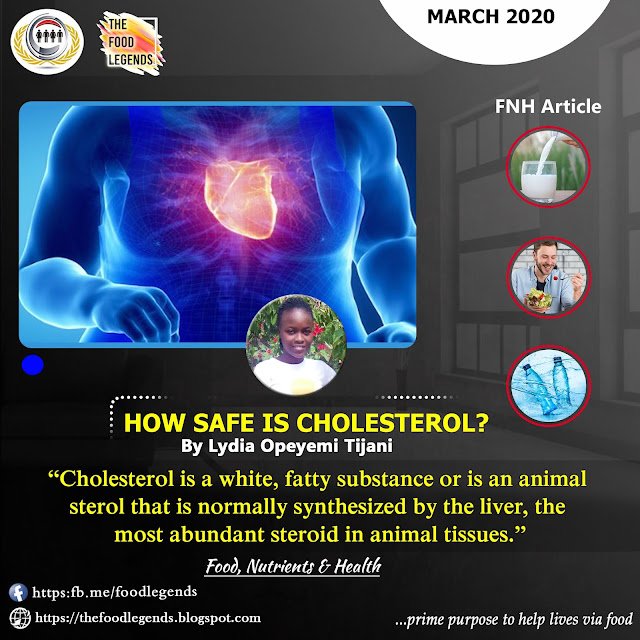 |
| Cholesterol |
WHAT IS CHOLESTEROL?
(HOW SAFE IS IT?)
The word "cholesterol" comes from the
Greek word "chole" meaning bile and "stereos" meaning solid.
Cholesterol is a white, fatty substance or is an animal sterol that is normally
synthesized by the liver, the most abundant steroid in animal tissues. It is
found in animal fat, made within the body and is a constituent of gallstones
and of artheroma. Cholesterol aids in the formation of vitamin D, the sex
hormones, androgen, estrogen and progesterone. It is also used by the body to produce
bile acids which in turn aid in digesting fats. Cholesterol is present in animal
foods. It is synthesized in the body by the liver independent of the dietary
intake. The body normally synthesized about 2g of cholesterol daily. The normal
blood level of cholesterol is 150 to 300 mg/dl(100ml)g blood. However, this
level of cholesterol is affected by the dietary intake of cholesterol rich
foods, like egg yolk, meat, shell fish, butter, cheese and milk.
The body receives cholesterol from 2
major sources which are present in the animal products we consume and it is
manufactured by the body itself in the liver and small intestine. Cholesterol
is carried in the blood stream by special protein molecules called "lipoprotein".
There
are different major types of lipoprotein which are low density lipoprotein (LDL),
High density lipoprotein (HDL) and Triglycerides.
Ø
Low density lipoprotein (LDL): The LDL is
referred to as bad cholesterol. It leads to a build up of bad fat in the artery
wall, which can lead to chest pain, heart disease, heart attack, stroke, kidney
and circulation problems. Food that are bad cholesterol levels include red
meat,full fat dairy, margarine and baked goods.
Ø
High density lipoprotein (HDL): The HDL
is referred to as good cholesterol because it protect us against heart disease
by carry the extra cholesterol out of the arteries, which lower the chance of
having a heart attack or stroke. Food which are good cholesterol include nuts,
oats, beans, vegetable oil, fruit and fatty fish particularly salmon, tuna and
sardines.
Ø
Triglycerides: is a form of fat made in
the body which often present in people who have diabetics or alcoholism. They increase
the risk of heart disease.
HIGH BLOOD CHOLESTEROL
High blood cholesterol is a
conditions in which there is too much of cholesterol in the blood. These
conditions usually has no sign or symptoms. Thus many people don't know that their
cholesterol levels are too high, people who have high blood cholesterol have a
greater chance of getting coronary heart disease ( is a condition which plaques
build up inside the coronary heart arteries. Plaque is made of cholesterol,
fat, calcium and other substances found in the blood. When plaque builds up in
the arteries, the condition is called "atherosclerosis". These plaque
can cause chest pain, heart attack and stroke when they reduce the blood flow
through the arteries.
Factors that can increase the
risk of bad cholesterol include: unhealthy poor diet, smoking, too much of stress,
obesity i.e having a body mass index(BMI) of 30 or greater put you at risk of
high cholesterol, lack of exercise.
To helps preventing high
cholesterol, you can quit smoking, manage stress, exercise daily, maintain a
healthly weight and eat a healthy diet.
The higher the level of LDL
cholesterol in the blood, the greater the chance is of getting heart disease.
The higher the level of HDL cholesterol in the blood, the lower the chance is
of getting heart disease.
"In
general, however, it is safe to say that cutting down cholesterol intake would
not do most people any harm because having too much of it in the blood cause
problems like heart disease, vascular disorders and high blood pressure".
Article By:
Tijani Opeyemi Lydia
Food, Nutrients & Health.
……………………………….
To read other related articles, visit our blog today
Reference:









No comments:
Post a Comment
Please share your view below